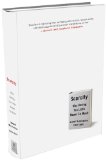new book – ‘Memory: Encounters with the Strange and the Familiar’ by John Scanlan
October 3, 2013
Memory: Encounters with the Strange and the Familiar by John Scanlan (Reaktion Books)
Book description from the publisher:
When we think of getting older, we know we will slowly lose more and more of our memory—and with it, our sense of where we belong and how we connect to others. We might relax a little if we considered the improvements in computer data storage, which may lead us into a future when the limits of our memory become less constricting. In this book, John Scanlan explores the nature of memory and how we have come to live both with and within it, as well as what might come from memory becoming a process as simple as retrieving and reading data.
Probing the ways philosophers look at memory, Scanlan reveals that some argue that being human means having the ability to remember, to see oneself as a being in time, with a past and future. At the same time, he shows, our memories can undo our present sense of time and place by presenting us with our past lives. And in a digital age, we are immersed in a vast archive of data that not only colors our everyday experiences, but also supplies us with information on anything we might otherwise have forgotten—breaking down the distinction between the memories of the individual and the collective. Drawing on history, philosophy, and technology, Memory offers an engaging investigation of how we comprehend recollection and how memory, as a phenomenon, continually remakes everyday life.






